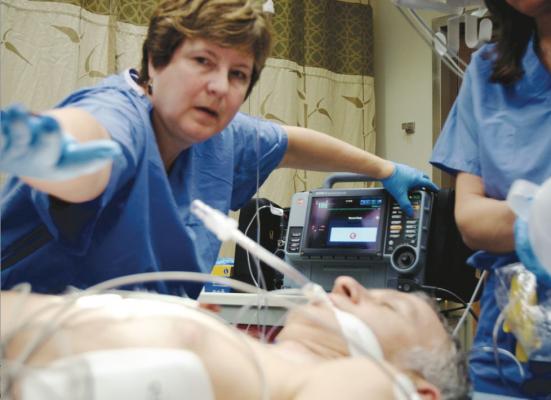
A man undergoes emergency care during a heart attack.
September 3, 2014 –In patients who experienced an acute coronary syndrome (ACS) event (such as heart attack or unstable angina), use of the drug darapladib to inhibit the enzyme lipoprotein-associated phospholipase A2 (believed to play a role in the development of atherosclerosis) did not reduce the risk of recurrent major coronary events, according to a study published by JAMA. The study is being released early online to coincide with its presentation at the European Society of Cardiology Congress.
A number of epidemiologic studies have shown that higher circulating levels of lipoprotein-associated phospholipase A2 (Lp-PLA2) activity or mass are associated with an increased risk of coronary events. Darapladib is a Lp-PLA2 inhibitor that reduces Lp-PLA2 activity in plasma and in atherosclerotic plaques, according to background information in the article.
Michelle L. O'Donoghue, M.D., M.P.H., of Brigham and Women's Hospital, Boston, and colleagues randomly assigned 13,026 participants within 30 days of hospitalization with an ACS to either once-daily darapladib or placebo along with guideline-recommended therapy. The study was conducted at 868 sites in 36 countries.
Patients were followed up for a median of 2.5 years. At the end of follow-up, the primary end point of the study, major coronary events (composite of coronary heart disease death, heart attack, or urgent coronary revascularization for myocardial ischemia) had occurred in 903 of 6,504 participants in the darapladib group and 910 of 6,522 participants in the placebo group (16.3 percent vs 15.6 percent at 3 years). Cardiovascular death, heart attack, or stroke occurred in 824 darapladib-assigned participants and 838 placebo¬treated patients (15.0 percent vs 15.0 percent at 3 years). There were no significant differences between treatment groups in the incidence and number of events for the individual components of the primary end point.
The rate of all-cause mortality at three years was similar between the groups (darapladib, 7.3 percent; placebo, 7.1 percent). The incidence of any serious adverse event was similar between treatment groups. The authors conclude that their findings “do not support a strategy of targeted Lp-PLA2 inhibition with darapladib in patients stabilized after an ACS event who are similar to those enrolled into this trial.”
For more information: jama.jamanetwork.com/journal.aspx


 January 05, 2026
January 05, 2026 









